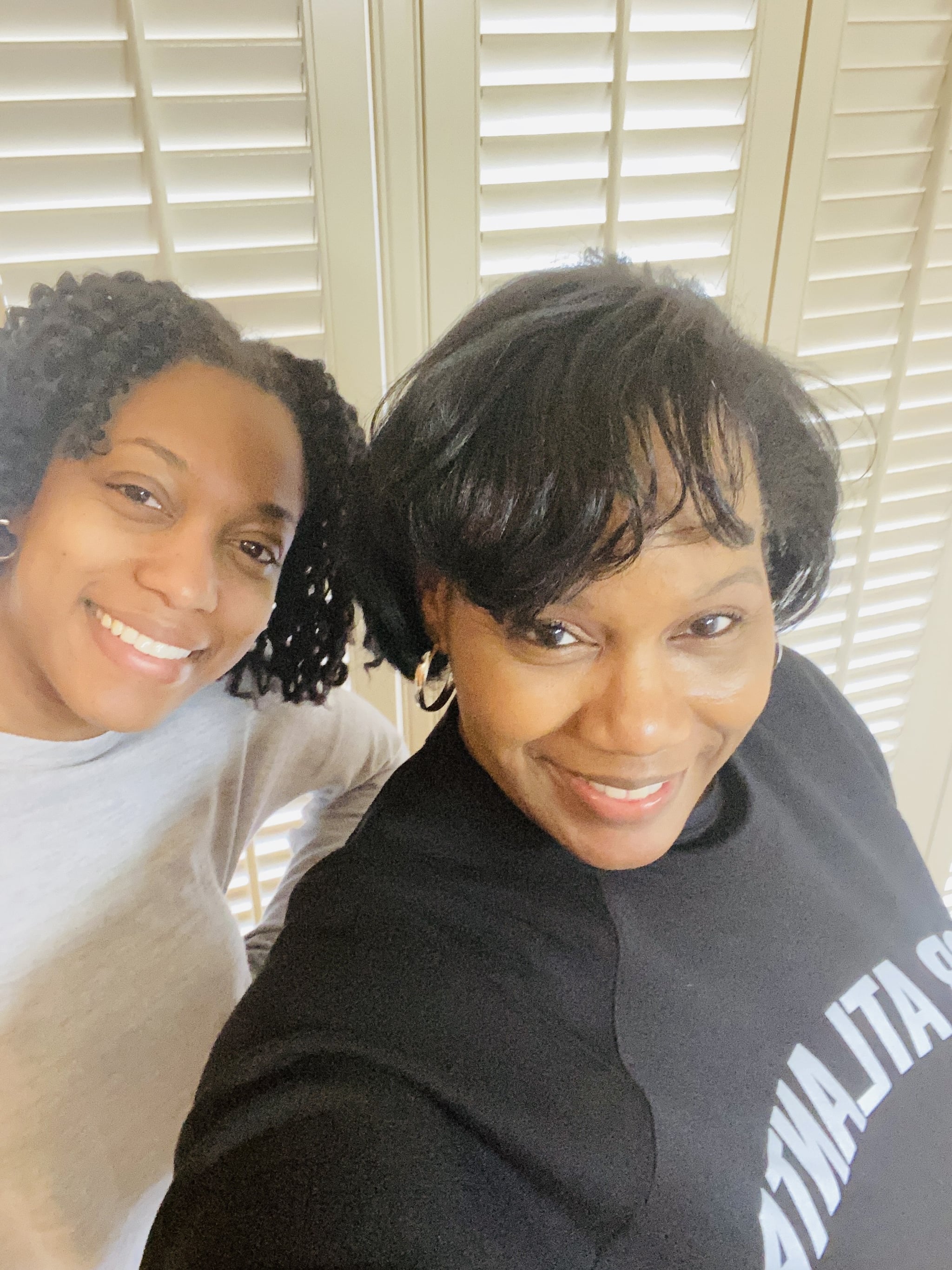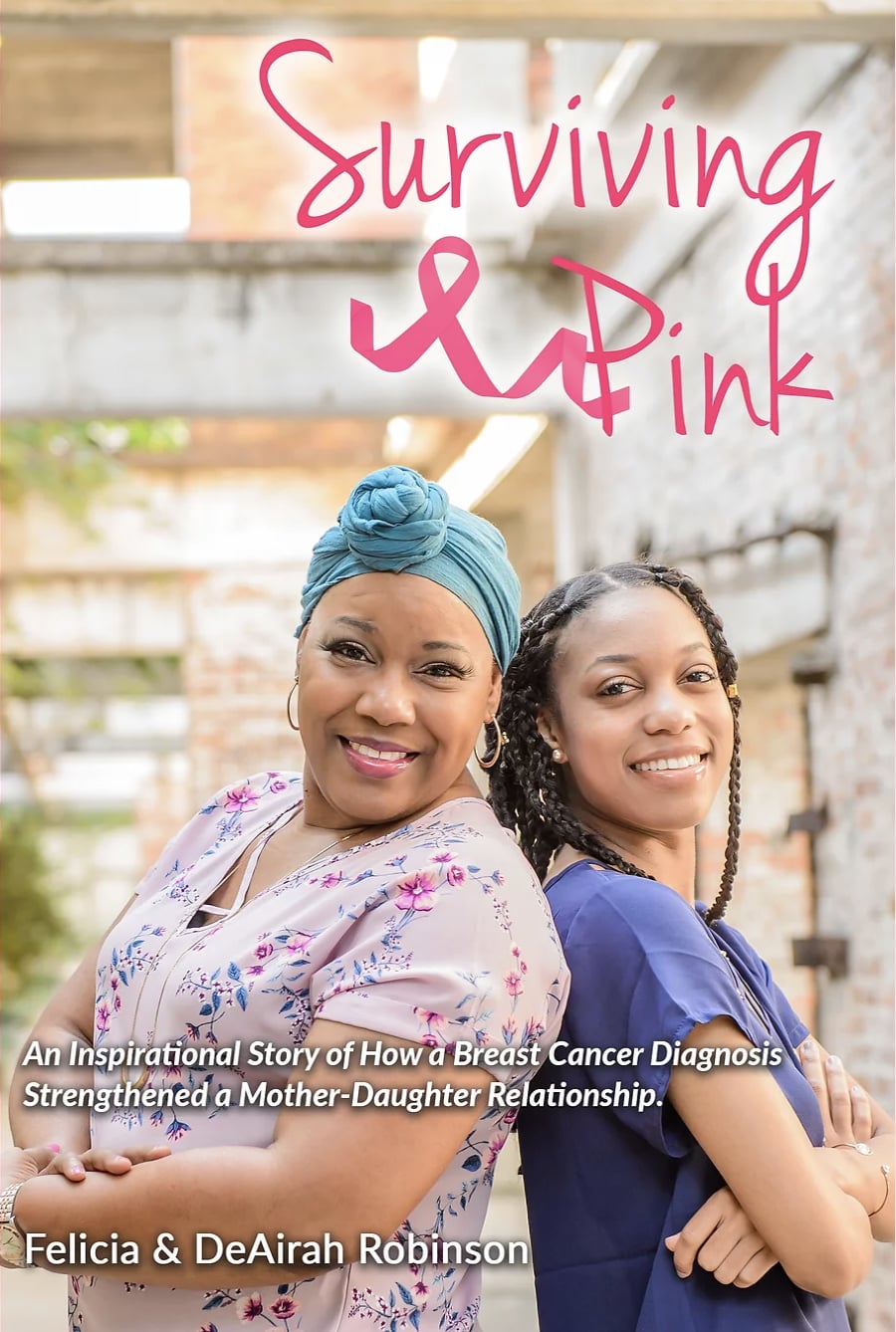
Image Source: Felicia Robinson
DeAirah Robinson was a senior in college when her mother Felicia, who DeAirah lived with in Georgia, asked her to feel a lump on her breast. “Our first reaction was, ‘Oh, it’s probably from the bra being a little too tight,'” Felicia tells POPSUGAR. But when the lump didn’t go away, Felicia decided to get it checked out, and in December 2017, she was diagnosed with breast cancer. From there, “everything just started moving so fast,” DeAirah remembers. By February 1, Felicia was at MD Anderson Cancer Center in Texas getting a unilateral mastectomy. The day after the surgery, DeAirah flew to Texas to help.
DeAirah supported her mom through her early recovery, then flew back to Georgia, where her schoolwork was waiting. “I thought [the mastectomy] was the end of the journey,” she tells POPSUGAR. But on Valentine’s Day 2018, Felicia called with a devastating update: the mastectomy hadn’t removed all of the cancer, and she’d need to get chemotherapy too. DeAirah had just driven home from class when she got the news. “I sat in the car and cried,” she remembers. “Knowing that she would go through this challenge … it was difficult to process.”
DeAirah had recently changed majors and had a full course load, but she instantly began planning how she could add taking care of her mom to her to-do list. “I didn’t really second guess, or think about it. I jumped into action,” she says.
DeAirah is among a growing number of Millennials who’ve taken on caregiving roles for loved ones. A a 2018 AARP report found that 10 million Millennials are caregivers, but that number may be growing. One in four Gen Z and Millennial caregivers were in caregiving roles for the first time during the pandemic, according to the Global Carer Well-Being Index.
This is no small task. Millennial caregivers spend about 21 hours per week on care-related duties, according to the AARP report — the equivalent of a part-time job. As a result, Millennial and Gen Z caregivers often end up balancing school, work, and sometimes parenthood with their caregiving duties. And 77% of caregivers say providing emotional support is one of their top responsibilities, a survey survey conducted by Embracing Carers found. The time and emotional energy that caregiving requires often means that people end up sacrificing their personal lives in some way, and over half of caregivers ages 18 to 34 say the role negatively impacted their long-term career goals.
“”I just knew my duty was going to be to care for my mother, attend her appointments, and ensure that she was good emotionally and mentally during this journey.”
For DeAirah, making her mom her top priority didn’t feel like a decision. “I just knew my duty was going to be to care for my mother, attend her appointments, and ensure that she was good emotionally and mentally during this journey,” she says. Her father worked nights, and she was commuting to college from home, but she still managed to accompany Felicia to most, if not all, of her doctor’s appointments, which ended up being invaluable: DeAirah would remind Felicia to tell the doctor about symptoms or side effects she’d experienced since her last visit, and helped her remember and understand all the medical information they received. “We’d get home and discuss, ‘What did they say?’ or ‘Okay, now I have to get this shot — what does that mean? What are those side effects?’ So we were constantly trying to read up and learn ahead of time what I was going to be facing to see how much involvement I was going to need,” Felicia says.
At one point, Felicia even moved into her daughter’s bedroom, sleeping on a recliner chair so she could be closer to DeAirah. “The first chemo hit me really, really hard,” Felicia says. “So [DeAirah] did a lot of consoling and positive talking and just kind of nurturing me at that time. The roles kind of reversed from being a mother to your daughter to your daughter mothering you.”
Although DeAirah was eager to help, coping with the situation could feel isolating. “I didn’t really have a go-to person to talk to about the situation,” DeAirah says. She was able vent to friends, but because she didn’t know anyone who’d been in a similar caretaker role, “I felt like they didn’t really get it,” DeAirah says. Loneliness is a huge source of burnout among caregivers in general, and The New York Times reports that it may be especially prevalent among younger adults. Even if their friends are going through similar experiences, they may be less likely to talk about it, and resources aimed at supporting caregivers are often targeted at older people. To keep her spirits up, DeAirah often relied on her faith and prayer, as well as writing. “I’d journal to myself if I found myself getting overwhelmed, or anxious.”
At one point, DeAirah considered taking a break from school. “I wanted to take a semester off in the spring semester to focus on caring for my mother, but she insisted that I stay in school,” DeAirah says. While she’s ultimately grateful, it was also stressful, she says: “I had that pressure of wanting to finish on time, but also wanting to make sure she was good.”
Finally, in June 2018, Felicia rang the bell at her treatment center to celebrate the end of her chemotherapy. “Seeing her ring that bell was just pure joy,” DeAirah says.
“I still knew physically she was kind of different and probably still felt different,” DeAirah says, but that didn’t stop them from marking the occasion with goodie bags for the nurses, a number four balloon to signify the rounds of chemotherapy Felicia completed, and a nice family dinner. “I just wanted her to feel celebrated,” DeAirah says.
When the COVID-19 pandemic began, however, DeAirah and Felicia were met with a new set of challenges. After finishing up chemo, Felicia was put on monthly, then quarterly injections of hormone blockers. Then, COVID struck — and suddenly, DeAirah was no longer able to accompany her mother into office visits and act as an advocate. Additionally, Felicia lost her job, and with it, her health insurance. The additional insurance she purchased still wasn’t enough to cover her continued care. It only brought the cost of her hormone blocker injections down from $5000 to $1500 per shot, for instance.
The pandemic’s impact on caregivers is undeniable. Nearly two in three people who provide caretaking support to loved ones say that the pandemic has made their work more difficult, according to Embracing Carers, and 77% of caregivers ages 18 to 34 say the pandemic made them feel more burned out than before. What’s more, in a survey of 952 people with chronic illness, 15.7% said that they faced a loss of income during the pandemic, reports the International Journal of Environmental Research and Public Health. Financial strain can be devastating for anyone, but especially those with high medical costs.
The challenges posed by the pandemic led Felicia and DeAirah to seek additional support. “I had to rely on a social worker for the first time,” Felicia tells POPSUGAR. While it was a difficult decision, it ended up being a game changer for both women. “[The social worker] helped us navigate through some resources that were available that I would have never known about or people are too prideful to reach out to those type of organizations,” Felicia says. Meeting the social worker also inspired DeAirah to go to graduate school for social work herself, after graduating college in July 2019. “I told her, I kind of think it’s God’s plan, because she was so close to me going through it,” Felicia says.
Despite the emotional and logistical challenges she faced while caring for her mother, DeAirah says that she wouldn’t change the experience for anything. While DeAirah wouldn’t have thought she could get any closer to her mom than she already had been before her diagnosis, caregiving “enhanced our relationship. And as I’ve gotten older, it’s just gotten better,” she says.
Interestingly, Millennials are more likely than other age groups to say that caregiving is rewarding. But that doesn’t mean they don’t get overwhelmed. Caregiver burnout is real, especially now.
Thats why it’s so important to build a supportive network. For DeAirah, she eventually told a group of women at church about her struggles. “They were very supportive and jumped in and asked if I needed anything. They reached out to my mom as well … and they just covered me in prayer,” she says. You can find support groups using the Family Caregiver Alliance or The National Alliance for Caregiving. Both organizations also provide info on financial resources and in-person events and retreats for caregivers and their loved ones.
Read more about Felicia and DeAirah’s story on their website and in their co-authored book, “Surviving Pink.”

